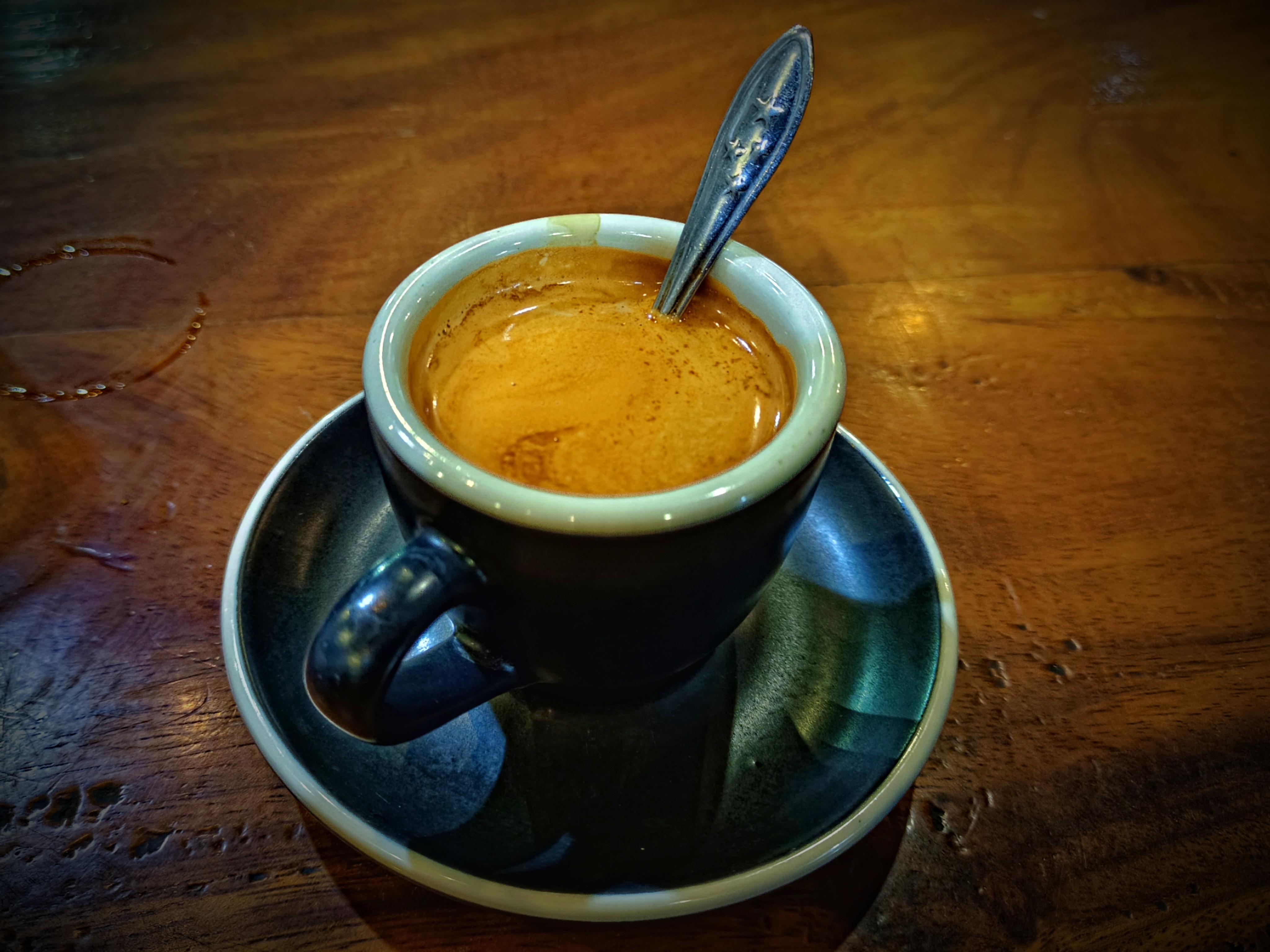
I used to think coffee was just a black liquid that refreshed a tired body with caffeine. A tool, not an art. But that afternoon, under a gray sky groaning with rain, I learned that a cup of coffee is a gateway to a slower, more honest, and more human world.
The cafe where we were sitting was not a fancy industrial place with copper chandeliers or a forced jazz playlist. It was a simple space on an old street corner, with weathered wooden walls that held the aroma of roasted coffee beans, dampened by decades of cigarette smoke and laughter. Here, time felt sticky, like syrup dripping slowly. Our table—number 5, by the window—had long scratches on its surface, knife or key marks perhaps left by hurried visitors. On it, two cracked ceramic cups steamed, dancing with the smoke chasing the humid air.
That friend—Ardi—sat across from us. We hadn’t seen each other since graduating from high school, ten years ago. His once jet-black hair was now covered in gray, but his eyes were still the same: dark brown, sharp, and always sparkling, as if holding a secret joke. "You still owe me twenty thousand rupiah for the motorbike taxi fare to Syahrini's house in 11th grade," he said with a grin. I burst out laughing. Syahrini, the class president whose house was on the outskirts of the city, whom we visited when her leg was broken—just because Ardi and I wanted to cheat on a math test.
Our conversations flowed like raindrops on a windowpane about work. Ardi, now a freelance journalist, struggled with deadlines and censorship. While I was stuck in an office where "efficiency" was the mantra to replace humanity. "I'm like a robot paid to press the 'agree' button in soulless meetings," I complained. Ardi touched his cup, his fingers tapping out a patternless rhythm. "You know, this coffee comes from a farmer in Toraja whose son is studying in Jakarta. He said the coffee beans are a love letter to a stranger he'll never meet," he said. Then he laughed, "But maybe that's just advertising."
We talked about high school memories: how we used to steal the lab key to have midnight “tea bag parties,” or when Ardi wrote love poems for his chemistry teacher on the back of an exam paper—which led to a week-long suspension. But these days, the word “love” is more often heard at wedding receptions or conversations with notaries. “I used to want to be a novelist,” Ardi said, his eyes staring out at the rain. “Now, all I write are reports and bills.”
The cup of coffee in front of me—espresso with heavy cream—slowly lost its heat. I took a sip, feeling a warm bitterness creep up my throat. Ardi ordered another, this time with rock sugar. “This sugar,” he said, stirring, “is like a memory. It makes the bitter taste more bearable, but if you drink too much, it takes away the original flavor.” The rain led us into a conversation about unresolved issues. Ardi talked about his ailing father, who was starting to forget the names of his own children. “I’m afraid that when he’s gone, all I’ll be left with are debts and words I haven’t had the chance to say,” he whispered hoarsely. I remembered my mother who always sent me her own coffee grounds every month. "We pay for our independence with loneliness," I grumbled.
In another corner of the cafe, an old man sat alone, reading a newspaper that was wet on the edge. At the next table, a couple whispered with their heads bowed, their hands intertwined on the table like intertwined roots. It struck me: this cafe was a stage where everyone brought their own monologue, then turned it into a dialogue with the world.
"Have you ever thought, why are we never really done with the past?" Ardi asked suddenly. "Like coffee that has been swallowed, but the taste still lingers on the tongue." I sighed. Maybe because the past is not something that is left behind, but something that is carried. Like coffee beans in a sack: the further it is carried, the deeper the aroma penetrates.
Our conversation jumped to a postponed dream. Ardi wanted to buy a coffee plantation on a mountainside, "A place where time is measured by harvest seasons, not deadlines." Me? I just wanted to sleep soundly without nightmares about worksheets. But here, between the rain and the coffee, we could pretend that the world would not demand our broken promises.
As dusk fell, the rain eased to a drizzle. Ardi took a small notebook from his bag and tore out a blank piece of paper. "For your debt of twenty thousand," he said, handing me the slip of paper. Laughing, I tucked the "fake money" into my wallet—a promise to meet again.
And we walked out of the cafe leaving empty cups and the remnants of conversation that had soaked into the wooden table. And in the sky the clouds began to clear but the air still whispered about rain that might fall tomorrow from my observation.
"Today's coffee..." Ardi said, turning to me.
"...will be a memory tomorrow," I replied.
And we walked home, knowing that this conversation would never end—it would only pause for a moment, like cold coffee, before being rewarmed by other encounters.
View or trade
LOHtokens.@seha76, You have received 1.0000 LOH for posting to Ladies of Hive.
We believe that you should be rewarded for the time and effort spent in creating articles. The goal is to encourage token holders to accumulate and hodl LOH tokens over a long period of time.